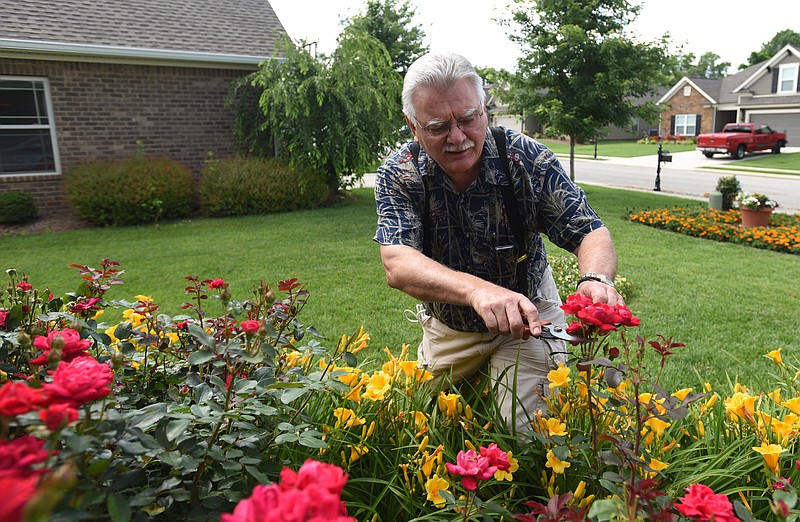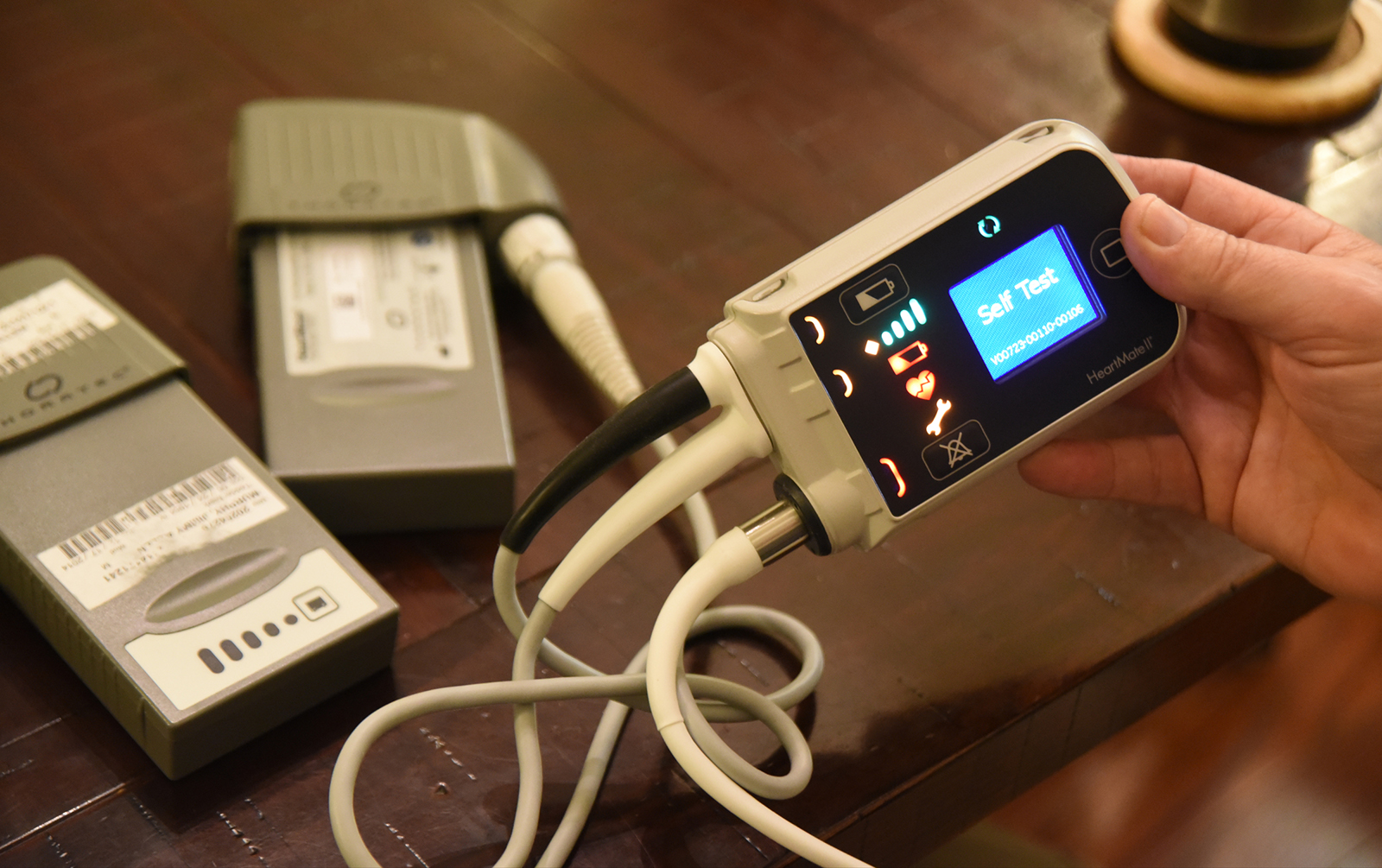Read more
Getting the heart in the right place
Jimmy Murphy waters his garden by moonlight as dawn glows behind his Hixson neighbors' rooftops, the horizon just bright enough for him to detect the crimson of his roses, golden daylilies, purple clematis, magenta mandevilla, pale blue pansies and ivory columbine.
He enjoys the marigolds' astringent scent and the honeysuckle's faint spice. His old garden at his Soddy-Daisy home was bigger, but his doctors warned him that he must move closer to their care, so he built a new blossom-filled landscape in this small yard.
Strapped to his waist is a battery pack that powers a metal device the size of a money belt. He must wear both or he will die. A tube runs from the device through the wall of Murphy's stomach and plugs into a Left Ventricular Assist Device (LVAD) implanted in his chest.
"I'm careful to work in the garden when it is cool because, if I perspire, the area where the LVAD tube enters my stomach gets wet and that poses a risk of infection," says Murphy, whose calmness approaches Zen level.
The LVAD is the only thing that keeps Murphy's heart pumping blood. If its batteries go dead, an alarm shrieks and they must be immediately replaced or he can die.
It seems somehow cosmically unfair because he has never smoked nor drank beer; he ate healthy food, worked out at the gym. In fact, he was running five miles a day when doctors discovered the left anterior descending artery of his heart was 90 percent blocked; doctors call the artery the "widowmaker" because, when it is completely clogged, death is instant.
His older brother, fit and healthy at the time, died at 41 when his widowmaker shut down without warning. He was at the wheel of a car, which a police officer saw zigzagging down a mountain road until it crashed into a tree. Rushing to the accident, the officer saw huge gashes from the broken glass on the driver's face but no blood. Murphy's brother died so suddenly, his heart was no longer pumping when he hit the tree. Murphy learned that his brother had a rare genetic disease passed from mothers to sons that causes the widowmaker to congest even in healthy eaters.
Murphy, who is 58, now fully understands what he faces.
"I've had seven heart attacks in the last seven years, and several of them I thought would be my last minutes on Earth," Murphy says. "The LVAD is a temporary fix. My doctors told me the only solution is a heart transplant.
"In Texas, my doctors say the average wait time for a heart is seven days," Murphy says. "In Tennessee, the average wait time is a year and two months. "
With those figures in their minds, on June 20, the Murphys drove to Dallas to wait for a heart transplant at Baylor University Medical Center. They are able to afford to the trip and wait in a hotel only because Murphy's son set up a GoFundMe page that raised more than $30,000 for his father. In some cases, money for lodging can be the difference between life and death for a heart patient.
"You can't be on the heart recipients active list if you don't have the resources to stay close to the hospital transplant center because once brain death is declared and the family gives its permission for a transplant, there's only a four-hour window in which to get the heart to the donor," says Dr. Shelley Hall, medical director of heart transplantation at Baylor University Medical Center. "Abdominal organs like the liver and kidneys are more resilient and 24 hours can pass before the transplant. But the heart is more delicate."
Feeling great when he arrived in Dallas, Murphy checked into the hospital - and promptly got an infection, taking him off the transplant list. Antibiotics cleared up the infection, but the illness took him off the transplant list for about two weeks.
He's back on the list now and still waiting.
The road so far
Despite the reminder of his fragile heart hugging his waist, Murphy manages a full life teeming with friends, family and volunteer work, including charitable work in Russia, Indian leper colonies, the Honduras and Ukraine. He retired from his job at W.R. Grace chemical company, where he worked his way up from electrician to maintenance department manager. He retired early due to his health and became an ordained minister. He walks Shadow, his big happy dog, attends church, teaches Bible study and, of course, gardens.
Murphy was on his treadmill in March 1997 when he felt "burning, about the size of a quarter, right in the middle of my chest," he remembers. "After I got off the treadmill, it would go away briefly then come back."
When the pain became continuous, he went to the hospital, where he got an arteriogram, which uses a dye that is brightly illuminated by X-rays so doctors can see inside arteries. The doctors were shocked by what they saw in Murphy's heart.
"They said my widowmaker had 90 percent blockage," Murphy says.
In his first open-heart surgery on April 10, 1997, two stents (devices resembling tiny bits of pipeline) were inserted in the artery to keep it open. Just six months later, he went to Russia on a mission trip to help raise funds for a poor congregation there. In the late 1980s, then-Russian President Mikhail Gorbachev declared glasnost - "friendly openness" - between the U.S. and Russia, but it still felt like the Cold War to the Murphys.
"I was taken off a train in Russia by soldiers with weapons drawn over a lost visa," Murphy says. "It took several hours to convince them I was not a criminal and several days to obtain an exit visa so I could eventually leave. Glenda and I spent the Russian winter in very harsh conditions."
Yet he loved the Russians he met at Belgorod, a small river city 350 miles south of Moscow whose impoverished-yet-exquisite church had an azure roof and yellow onion domes. Belgorod's winter temps can plunge to 20 degrees below zero, yet Glenda and Jimmy often trudged about a mile through blizzards for Bible-study nights.
Over the next 13 years, he flew to Russia 20 times and raised money to buy a van for the Belgorod church. Since then, the Murphys have made another 20 trips to Russia, an additional six times to Ukraine to help Gypsies, a persecuted population since the Stalin era from the 1920s to the '50s, and to minister to inmates of Rawicz, the massive fortress prison in Kharkov.
They also flew twice to India on behalf of AMG International, a nonprofit that provides food, clothing and medical care to lepers.
"AMG International located in Chattanooga has built several orphanages and villages for leprosy victims, who live in little concrete block huts," Murphy explains. "The people live on the landfills and make their living going through the garbage."
Doctors finally forbid him to fly because it was too rough on his heart, but he still Skypes with his overseas friends.
Working together
When the Murphys recharge his LVAD batteries or clean the equipment, they are clearly a team, passing tiny devices and big machines between them as silently and smoothly as surgeons.
"I would tell any wife going through this that it helps to learn as much as you can about the devices and equipment; you feel less helpless and more like you are winning the fight to keep the one you love alive," Glenda says.
A slim, soft-spoken woman, Glenda is blessed with steely resolution. At a Hixson hospital, she says doctors seemed annoyed by Murphy's normal EKG and left him alone for hours in excruciating pain. Murphy says he asked a nurse for help but she replied, "No, not until you ask in a more pleasant tone of voice."
Murphy was in too much pain to don his shirt, so his wife draped it across his shoulders and helped into the parking lot so he "wouldn't die with mean people." They went to Erlanger, where he was promptly treated for a heart attack.
On another occasion, Glenda took him to the hospital when he had jaw pain and a 100.5 temperature. His health insurance company would only allow him to stay more than 36 hours if his temperature hit 101; it didn't and the hospital was forced to release Murphy, who quickly developed pneumonia. Back in the hospital, IVs plugged into both arms, he heard doctors tell Glenda he might not survive the night.
Murphy is a tall, strong, cheerful man who seemingly never wavers in his belief that God gave him a great life - but that night, tears ran down his face.
"I asked God why he let me live through all this suffering only to let me die from pneumonia," he recalls. "Then a young nurse came in and held my hand and told me everything would be all right. To this day I remember her name tag said 'Grace.' Suddenly, my fear drifted away."
As he prepares for his Dallas operation, he finds himself constantly thinking about his potential heart donor, especially when he plays with his 11 grandkids.
"Yesterday, I wondered if he was a daddy and was he having dinner with his kids," Murphy says. "The best news of my life, that I have a heart coming, will be the worst day of his family's life because they lost their loved one. When I am in church, I wonder if he is in church and does he like to sing.
"I know that people die every day in accidents so I won't be the cause of his family losing him. But my heart still goes out to that family and I pray for them."
Contact Lynda Edwards at ledwards@timesfree press.com or 423 757-6391.

